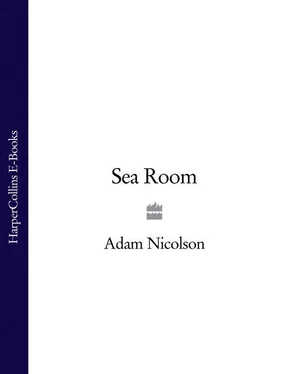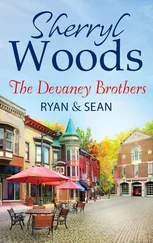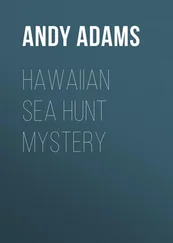I laughed.
‘You can no more say that those islands belong to you than I can say that I’m the landlord of the moon.’
Hughie rolled his head and smiled at the man, there-thereing, calming the situation, murmuring to both of us that quietening growl he uses to his dogs. ‘Sit down, sit down,’ he said, patting the bench beside him.
The man sat down and went on. He took Hughie by the arm. ‘This is the man who owns the Shiants. They’re yours, aren’t they, Uisdean?’
Hughie looked down, his turn for bashfulness. ‘Oh, I wouldn’t quite say that, Murdo.’
‘Well, this is the man who should say he owns the Shiants anyway. He’s got the sheep on the place. He does the work there. And he looks after it. And what have you got to say about it? What do you do to say that the Shiants are yours?’
The answer, if I had given it, would have ended in a fight. The Shiant Isles are mine; I can say that they are my five hundred acres of rock, grass, cliff and wildness, stuck out in the middle of the Minch between Skye and Lewis, besieged by the seas around them, because my father gave them to me. He had bought them after his grandmother had died and left him some money. The advertisement had been seen by his mother in the Daily Telegraph . Colonel Macdonald from Tote in Skye, who had bought the islands the year before, had imagined they might be ideal as a stud where he could breed racehorses. He had been sweet-talked into the ridiculous purchase by Compton Mackenzie, the novelist, who owned the islands at the time and was, as ever, strapped for cash. Mackenzie had acquired them in 1925 from the executors of Lord Leverhulme, and Leverhulme had bought them in 1917, along with the whole of Lewis and Harris, from the Mathesons. The Mathesons, in their turn, afloat on opium millions from trade between Hong Kong and mainland China, had in 1844 bought Lewis from the Mackenzies, the ancient family of the Earls of Seaforth, who withdrew to their territories on the mainland. The Mackenzies, in a chaotic period of unparalleled violence and treachery at the beginning of the seventeenth century known, in one document, as ‘The Ewill Trowbles of the Lewes,’ in which ‘the Macleoid of the Lewes was with his whol Trybe destroyed and put from the possession of the Lewes’, had bought the property from some gentlemen of Fife, who had been granted it by the Crown to set up a colony, even though the hereditary owners, the Macleods of Lewis, were still, at least partly, in possession. Only ‘after great trouble and much blood’ did the Mackenzies get hold of the islands. For their part, the Macleods – ‘the stoutest and prettiest men, but a wicked bloody crew whom neither law nor reason could guid or moddell, perpetuallie destroying one another’ – had stolen it in the twelfth century from the Nicolsons, who had arrived as Vikings perhaps three hundred years earlier. Presumably they – we – had done dreadful things to the previous inhabitants.
Nicolson, Macleod, Mackenzie, Matheson, Leverhulme, Mackenzie, Macdonald, Nicolson: twelve hundred years, eight sets of landlords claiming the Shiants as theirs. I was their heir and that’s why I could claim to be their owner and Hughie MacSween couldn’t. But I didn’t say any of that. Hughie bought the man a drink and – the blood of the Vikings running a little thin – I hid behind him.
In 1894, the Reverend Donald MacCallum, the highly emotional Minister of the Parish of Lochs in Lewis, of which the Shiants have been a part since the 1720s, made a long and passionate statement to a Royal Commission that was hearing evidence on the state of crofters in the island. Rolling in its Biblical allusions, wildly overstated, dependent more on a rhetoric that goes back to the subversive roots of Christianity itself than to any modern understanding of rights and responsibilities, it is one of the grandest attacks ever made on the idea of the landlord. ‘Great evils,’ MacCallum began largely,
have necessarily resulted from the fact that land, lake, river, and estuary are appropriated to the sole use, and regulated by the will of a few irresponsible individuals styled by themselves and others as lords. Every man has a right, natural, and God-given, to the earth and its fullness – its fullness of light, air and water, of vegetation and fruit, of beast, bird and fishes, of metals and minerals. The lords who first sold the land had no right to do so, and therefore the lords who bought the land are not the owners thereof. That which a man has no right to sell cannot become the property of the man who buys it.
My apostolic succession from the Nicolson Vikings a millennium ago means nothing. The idea of ownership is itself illegitimate. MacCallum went on:
Lordism impoverishes the land. The wealth that is on sea and land, instead of being used in rearing the families of those who earn it, is spent in providing luxuries for idle lords. The destitution and the plague which follow in the wake of this usurper lift up their voices against it and condemn it. Lordism devastates the land. On the face of the deserted villages, once the happy homes of the free and the brave, now lying in silent desolation, we read: ‘The scourge of lordism has passed over us.’ I never heard of any creature having a swallowing capacity equal to that of lordism. The cattle and the ears of corn which Pharaoh saw in his dream come nearest to it.
There are many ruins and signs of abandonment on the Shiants and in Pairc, the big block of Lewis nearest to the islands, and that emptiness now is a symptom of the very landlordism of which I am the current beneficiary.
Under cross-examination from the Commission, MacCallum was taken apart. He clearly knew very little indeed about the issue over which his pulpit language had taken such magnificent flight. He had no idea of the acreage of his parish, the number of its inhabitants, the amount of fertile arable ground available to them or the productivity of the lands which he claimed they were denied. He was humiliated by the lawyers. But his words, which I first read twenty years ago in the enormous volume the Commission produced, continue to resonate with me. Perhaps what MacCallum has to say is true of all property, but the outlines are especially clear in this stark and naked landscape. My claim on the Shiants, not to put it too finely, is dependent on a succession of acts of violence, quite literally of murder, rape and expulsion. Money may have passed hands recently – my father paid £1400, Macdonald £1500, Compton Mackenzie £500 – but what the Rev. MacCallum said is true: ‘The lords who first sold the land had no right to do so, and therefore the lords who bought the land are not the owners thereof.’
My islands are not a place from which to exclude others. I have derived more richness from the Shiants than from anywhere else on earth. I have felt utterly sustained for years at a time by this wild and magnificent place. Is it for me, given this, to shut anyone else out? There are several good landlords on Lewis and Harris, who allow free, universal and weekly access on a Saturday to their salmon rivers; who encourage those who might want to poach the deer to come and shoot the hinds, again for free, in the season. These are recent developments and not all Lewis landlords have subscribed to them. There are one or two who still operate estate policies of rigid and at times harsh exclusivity, who do their best to prevent people walking on their hill, at least during the stalking season, who send out their gamekeepers and water bailiffs to search through the fishing boats in the coastal townships, looking for the nets used by salmon poachers, who have even sent helicopters out to look for nets in the sea, who in the last few years have attempted to have a stretch of public road privatised. There are some estate owners, in other words, who continue to behave as if their ownership of these pleasure zones bears few or even no responsibilities to neighbouring communities.
Читать дальше












